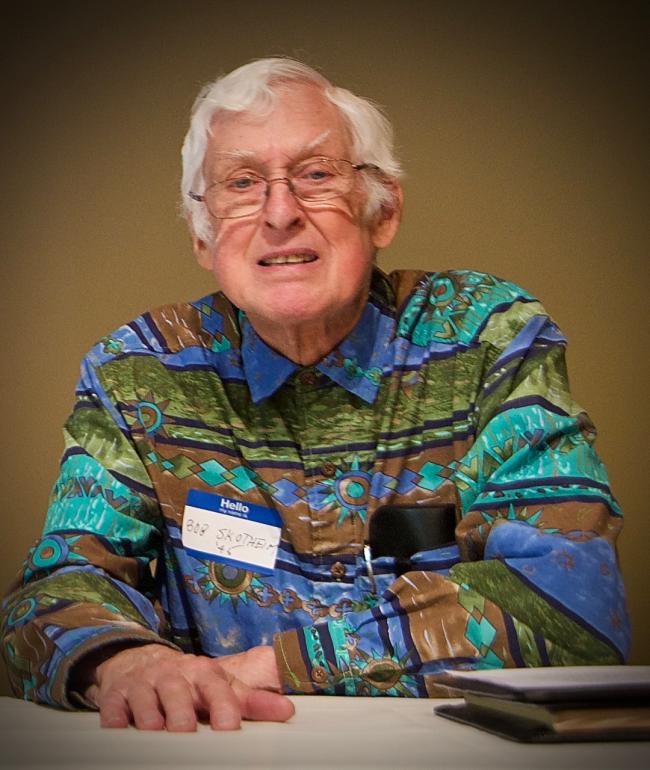Memories of Fauntleroy in the 1940's; "The ideals of our historically privileged community remain valid"
Robert Allen Skotheim, who attended Fauntleroy School in the 1940's spoke at the Centennial Celebration for the school on May 21. Skotheim is an author, historian and was President of Whitman College and Director of the Huntington Library.
Mon, 05/22/2017
Editors Note: These are the remarks delivered by Robert Skotheim at the Centennial Celebration for Fauntleroy School that was held on May 21. Skotheim, an alumnus of the school was one of the featured speakers at the event, and went on to become President of Whitman College, Director of the Huntington Library, and winner of the Guggenheim Fellowship for Humanities. His remarks are reproduced here with his permission.
By Robert Allen Skotheim
I want to take us back 75 years to 1942, World War II, the beginning of the most important years in Fauntleroy for the oldest of us gathered here today. Though a tragic event in many ways, the Second World War enhanced life for most Americans, including those in Fauntleroy, bringing them out of the Great Depression and ushering in the prosperity of the post-war era.
During the war our father, Sivert Olaus Skotheim, was principal of Fauntleroy School, as well as Director of the YMCA, and as a mid-30s father of four children (my sisters, Alice, Mary and Kristin and I all attended Fauntleroy School), he was exempt from the draft, which had taken away the Director of the Y. The school, the Y, and the Congregational church, enveloped by the white community, largely middle-class, with the Colman family at the top in Laurentide, and the Hopgood family, without running water at the bottom at 100th and 45th in Arbor Heights, were a microcosm of America when it was great. There were no people of color—housing covenants prohibited it—and most women stayed home with their children. Though our father was aware of the religious minorities, they were almost invisible to us children. Only through their obituaries later in my life did I learn of the Jehovah’s Witnesses, Jews and Catholics.
Like the Whittakers, the Skotheims were Hilltoppers, living in Arbor Heights. However, most of our friends lived in Fauntleroy, and our activities were at school, the Y, and the church. My paper route served 47th and Laurel Beach Sanatorium. Whether we walked home up Haring Road or down to Laurentide, we were centered in this little valley of the three institutions. I should note that not everyone participated in the church or the Y, but everyone attended Fauntleroy Elementary School in the 1940s. Private schools were not what made American great in West Seattle.
I will relate just one story from that time. It is so nostalgically remote as to make us think that the past is, indeed, a foreign country. Seventy-two years ago, May of 1945, on V-E Day, I learned of the end of the war in Europe by reading the headlines of the Seattle Times when I picked up my papers in Fauntleroy. On that day, in the euphoria of the moment, in our father’s words, he “marched” the Fauntleroy school students across the street to Pastor Mary McKie’s church to pray and give thanks for peace in Europe. Half a century later, when our father at my age now reflected on that moment, he characterized his actions as inappropriate, violating Constitutional separation of church and state, and ignoring religious differences among the children. He recalled that no one complimented, or criticized, the church visit, except for Pastor McKie, who approved it.
Despite the negatives, it is hard for me not to be nostalgic about Fauntleroy in the 1940s, especially because our father was Principal, coach of our teams, and Y Director. Images have a warm glow: Jim and Lou Whittaker, knees high, rapidly striding Haring Road; Dr. Calvin making house calls for high temperatures and bad colds, concluding each word of advice with “Don’t you know”; babysitting the Durham children, who were sweet; maintaining law and order on Barton with the Junior Safety Patrol; watching the “big boys,” Ernie Karlstrom, Jay Gilmour, Russ Casson, Warren Calvin and the Whittakers, play basketball at the Y; going to Horsehead Bay on Ken Colman’s “Osprey” for a week in the summer, which cost $1.75 for the week, not the boat ride; swimming lessons in the Colmans’ private pool. For some of us, America was great the first time, if we lived in Fauntleroy. Not everyone was allowed to, of course.
The mixed picture is obvious: nostalgic recollections by those of us who enjoyed the relatively homogenous community in the past does not amount to a prescription for a more diverse community today and in the future. At the same time, the ideals of our historically privileged community remain valid. To provide a good education for all children, to provide recreational opportunities, to provide food and shelter for all residents, and to allow freedom of religion comprise the aspirations of every community, past, present and future.


